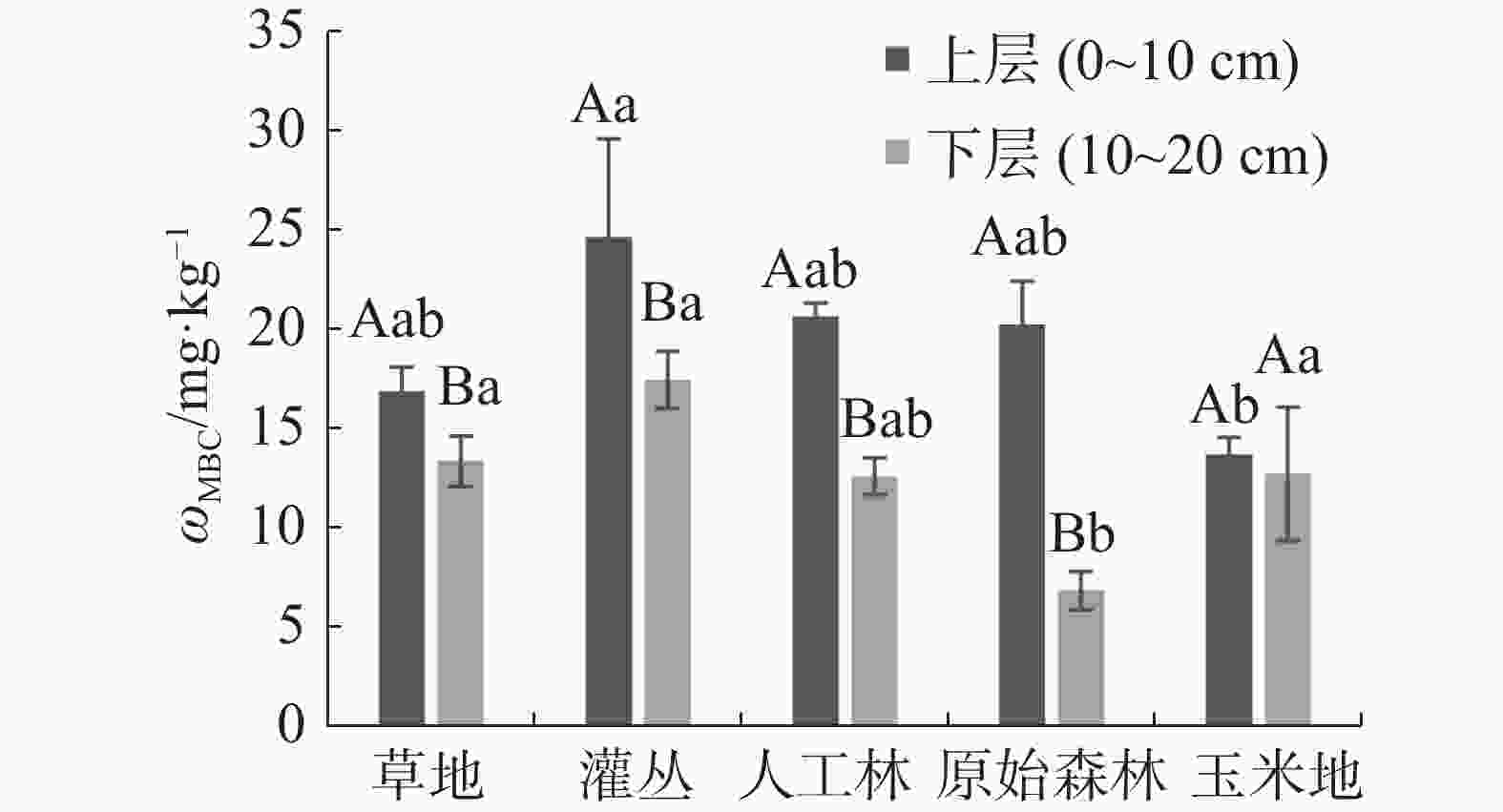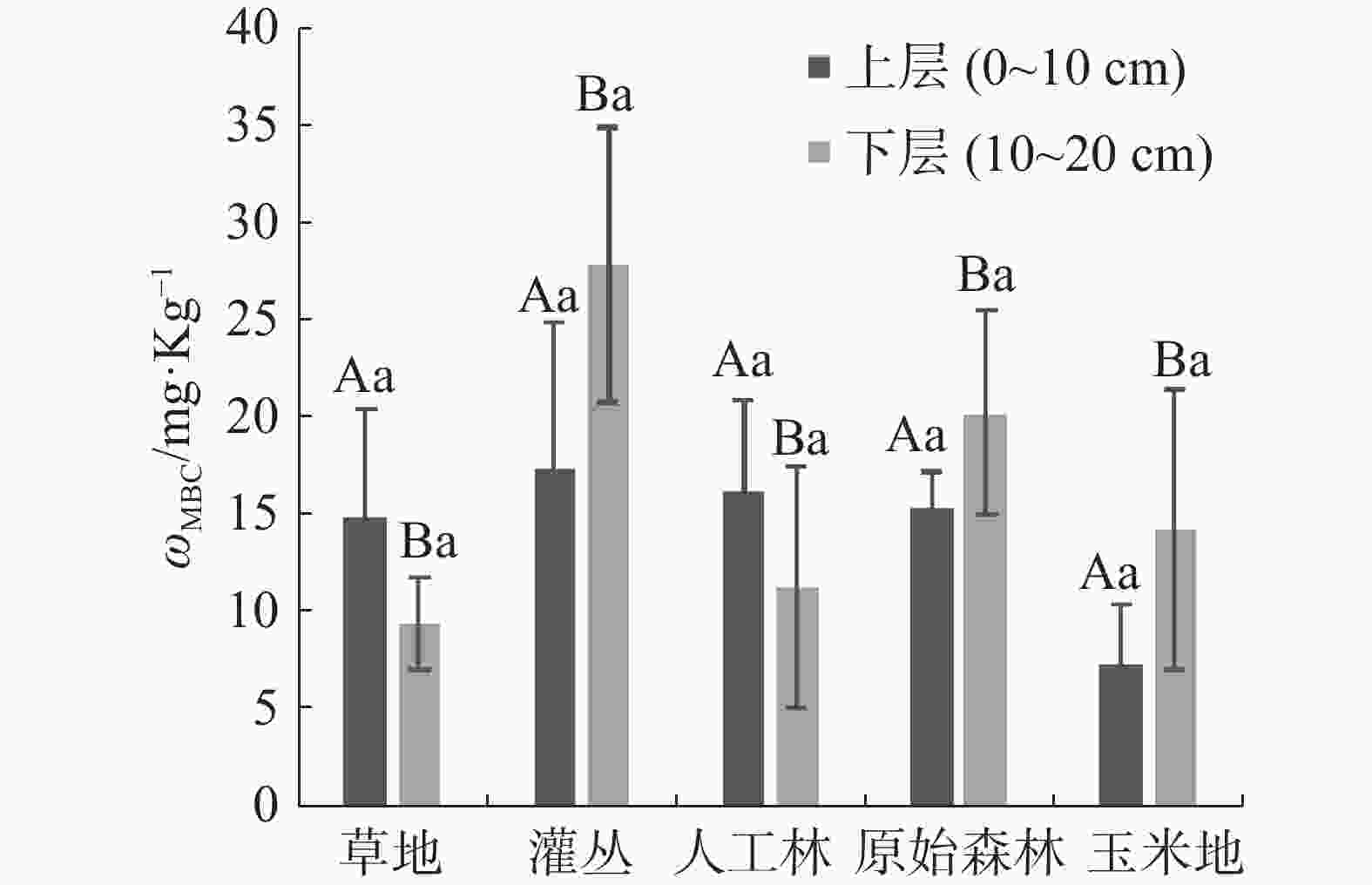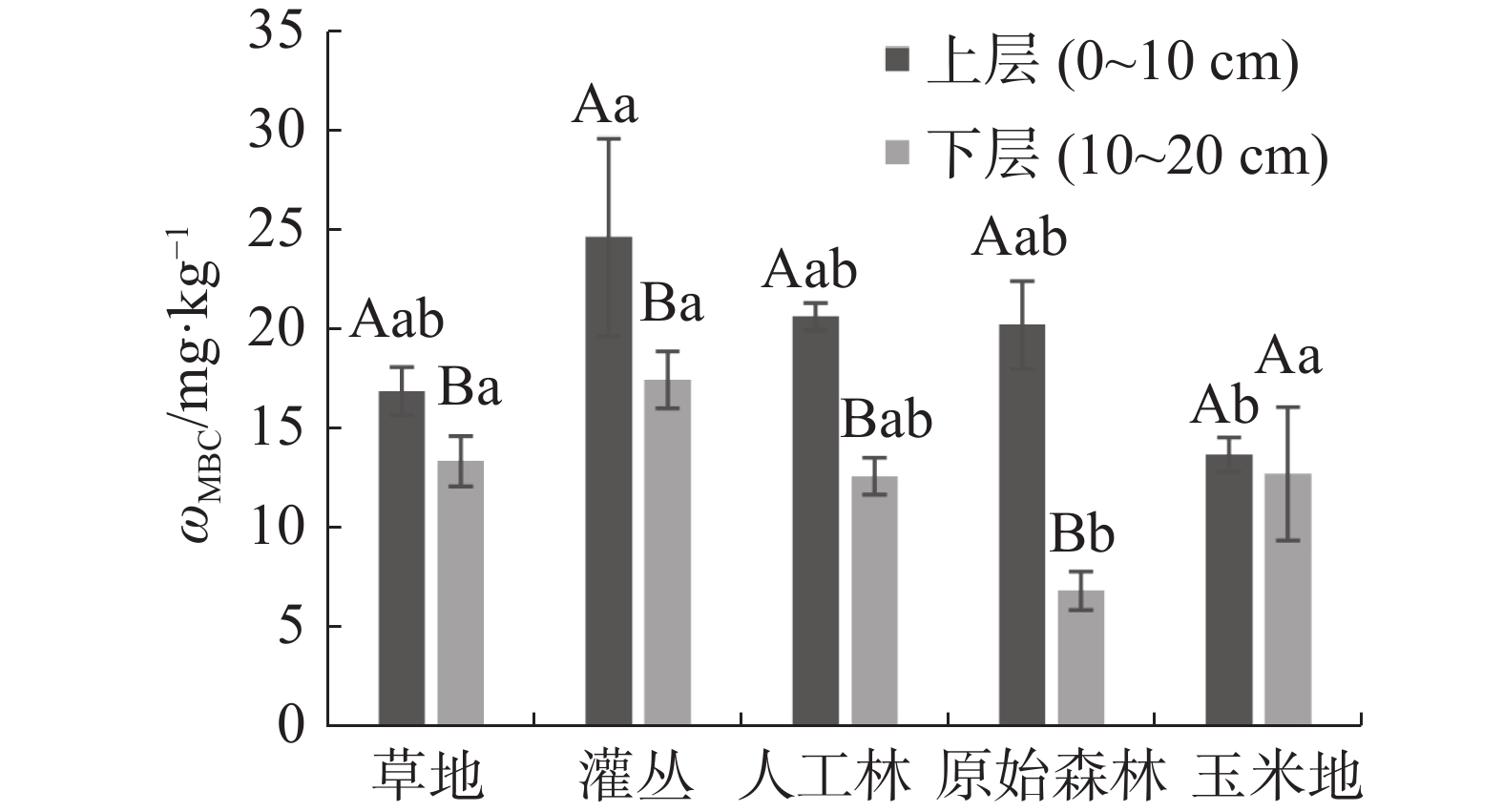Response of soil microbial biomass carbon and nitrogen to vegetation succession in different soil depths of karst fault basin
-
摘要: 为了解岩溶断陷盆地底部不同植被类型土壤微生物量碳氮(MBC、MBN)含量的变化,以中国西南典型生态脆弱区云南省岩溶断陷盆地底部原始森林、草地、人工林、灌丛和玉米地土壤为研究对象,探究土壤微生物量碳氮对植被类型的响应。结果表明:灌丛类型土壤微生物量碳氮含量最高,微生物量碳氮含量随植被正向演替呈现先增大后减小的趋势;各植被类型土壤微生物量碳含量随土层深度增加而降低。多因素方差分析出土层深度和植被类型是土壤微生物量碳含量的显著影响因素(P<0.05),其中土层深度是土壤微生物量碳含量的极显著影响因素(P<0.01)。Abstract: The karst fault basin in Yunnan Province is a typical ecological fragile area in Southwest China, and it is characterized by dramatic topographic changes, coexistence of faulted basins, basins and mountains, and seasonal drought and water shortage, so surface water erosion likely occurs. Soil microorganism promotes the circulation of nutrient elements in soil, among which microbial biomass carbon (MBC) and microbial biomass nitrogen (MBN)—the indicators of soil quality—are of great research significance. In this study, primitive forests, grasslands, artificial forests, shrubs and corn fields in the karst fault basin of Yunnan were selected as the study objects. The changes of MBC and MBN in soil were measured, and then their response to vegetation types was analyzed. The results showed that the contents of soil MBC and MBN in shrubs were the highest, indicating that the shrubs in this study area are more conducive to the accumulation of soil MBC and MBN. In contrast, the contents of soil MBC and MBN in primary forests were lower than those in shrubs, which was considered to be the result of the the decrease of effective nutrients available for vegetation growth due to the degradation of primary forests, or the intense competition between plant growth and microorganisms for nutrients in primary forests and the fact that the demand capacity of vegetation growth was greater than the conversion capacity of soil microorganisms. The study also found that the contents of MBC and MBN increased at first and then decreased with vegetation succession, which may be related to the organic matter content and oxygen availability as well as the surface layer that conforms to microbial growth conditions. The content of soil MBC decreased with the increase of soil depth. Moreover, the soil depth and vegetation type are the significant influencing factors of the content of soil MBC (P<0.05), and the soil depth was the most significant factor (P<0.01). These findings provide a theoretical basis for the control of soil erosion and rocky desertification in karst fault basin of Yunnan Province.
-
Key words:
- karst /
- fault basin /
- microbial biomass carbon /
- microbial biomass nitrogen /
- vegetation types
-
图 1 MBC在不同土层、不同植被演替阶段的差异变化(P<0.05)
注:小写字母表示同一土层不同植被类型间差异显著(P < 0.05),大写字母表示同一植被类型不同土层间差异显著(P < 0.05),下同。
Figure 1. Variation of MBC in different soil layers and different vegetation succession stages (P < 0.05)
Note: Lowercase letters represent significant difference of different vegetation types in the same soil layer; capital letters represent significant difference of different soil layers in the same vegetation type (the same hereinafter).
表 1 采样点基本情况表
Table 1. Basic information of sampling points
植被类型 土层深度/cm 经度(E) 纬度(N) 海拔/m 优势物种 草地 上层(0~10)
下层(10~20)103°51′0″ 24°30′32″ 2 332.8 火棘(Pyracantha fortuneana)、针茅(Stipa capillata Linn)、狗牙根(Cynodondactylon(Linn.) Pers)、蕨类(Fern) 灌丛 上层(0~10)
下层(10~20)103°51′10″ 24°30′29″ 2 292.2 灌草丛(Shrubbery)、檵木(Loropetalum chinense (R. Br.) Oliver)、小果蔷薇(Rosa cymosa Tratt)、火棘(Pyracantha fortuneana) 人工林 上层(0~10)
下层(10~20)103°51′0″ 24°30′29″ 2 314.6 川东桤木(Alnus cremastogyne Burk) 原始森林 上层(0~10)
下层(10~20)103°53′38″ 24°30′32″ 2 341.5 云南松(Pinus yunnanensis)、小果蔷薇(Rosa cymosa Tratt)、火棘(Pyracantha fortuneana) 玉米地 上层(0~10)
下层(10~20)103°51′3″ 24°30′29″ 2 291.0 玉米(Zea mays) 表 2 植被类型和土层深度对土壤 MBC 含量的影响
Table 2. Effects of vegetation types and soil depthson soil MBC content
影响因子 自由度(df) 方差(F) 显著性(P) 植被类型 4 4.139 0.013 土层深度 1 22.431 <0.001 植被类型 × 土层深度 4 2.282 0.096 注:P<0.05表示显著,P< 0.01表示极显著。
Note: P<0.05 represents significance; P< 0.01 represents extremely significance.表 3 植被类型和土层深度对土壤 MBN 含量的影响
Table 3. Effects of vegetation types and soil depthson soil MBN content
影响因子 自由度(df) 方差(F) 显著性(P) 植被类型 4 1.556 0.225 土层深度 1 0.491 0.491 植被类型×土层深度 4 0.871 0.499 注:P<0.05表示显著,P< 0.01表示极显著。
Note: P<0.05 represents significance; P< 0.01 represents extremely significance. -
[1] Powlson D S, Prookes P C, Christensen B T. Measurement of soil microbial biomass provides an early indication of changes in total soil organic matter due to straw incorporation[J]. Soil Biology and Biochemistry, 1987, 19(2):159-164. doi: 10.1016/0038-0717(87)90076-9 [2] 康林玉, 刘周斌, 欧立军, 袁祖华. 土壤微生物促进作物生长发育研究进展[J]. 湖南农业科学, 2017(3):113-116. doi: 10.16498/j.cnki.hnnykx.2017.003.032KANG Linyu, LIU Zhoubin, OU Lijun, YUAN Zuhua. Research progress on effects of soil microbial on the growth and development of crops[J]. Hunan Agricultural Science, 2017(3):113-116. doi: 10.16498/j.cnki.hnnykx.2017.003.032 [3] Song D L, Xi X Y, Zheng Q, Liang G, Zhou W, Wang X. Soil nutrient and microbial activity responses to two years after maize straw biochar application in a calcareous soil[J]. Ecotoxicology and Environmental Safety, 2019, 180:348-356. doi: 10.1016/j.ecoenv.2019.04.073 [4] 王理德, 姚拓, 王方琳, 魏林源, 郭春秀, 吴春荣, 李发明. 石羊河下游退耕地土壤微生物变化及土壤酶活性[J]. 生态学报, 2016, 36(15):4769-4779.WANG Lide, YAO Tuo, WANG Fanglin, WEI Linyuan, GUO Chunxiu, WU Chunrong, LI Faming. Soil microbial and soil enzyme activity in a discontinued farmland by the lower Shiyang river[J]. Acta Ecologica Sinica, 2016, 36(15):4769-4779. [5] 张成霞, 南志标. 土壤微生物生物量的研究进展[J]. 草业科学, 2010, 27(6):50-57. doi: 10.3969/j.issn.1001-0629.2010.06.009ZHANG Chengxia, NAN Zhibiao. Research progress of soil microbial biomass in China[J]. Pratacultural Science, 2010, 27(6):50-57. doi: 10.3969/j.issn.1001-0629.2010.06.009 [6] Jawson M D, Elliott L F,Papendick R I,Campbell G S. The decomposition of 14C-labeled wheat straw and 15N-labeled microbial material[J]. Soil Biology and Biochemistry, 1989, 21(3):417-422. doi: 10.1016/0038-0717(89)90153-3 [7] Gupta V, Roper M M, Kirkegaard J A, Angus J F. Changes in microbial biomass and organic matter levels during the first year of modified tillage and stubble management practices on a red earth[J]. Australian Journal of Soil Research, 1994, 32(6):1339-1354. doi: 10.1071/SR9941339 [8] 王宇, 李燕, 谭继中. 断陷盆地岩溶水赋存规律[M]. 昆明: 云南科技出版社, 2003: 1-2.WANG Yu, LI Yan, TAN Jizhong. Occurrence law of karst water in fault basin[M]. Kunming: Yunnan Science and Technology Press, 2003: 1-2. [9] 张鹏, 胡晓农, 杨慧, 任梦梦, 周孟霞, 陈梁茵. 云南蒙自断陷盆地石漠化区土壤钙形态特征[J]. 中国岩溶, 2020, 39(3):368-374. doi: 10.11932/karst20200305ZHANG Peng, HU Xiaonong, YANG Hui, REN Mengmeng, ZHOU Mengxia, CHEN Liangyin. Characteristics of soil calcium forms of rocky desertification areas in the Mengzi fault-depression basin, Yunnan[J]. Carsologica Sinica, 2020, 39(3):368-374. doi: 10.11932/karst20200305 [10] 李成芳, 王忠诚, 李振炜, 徐宪立. 西南喀斯特区土壤侵蚀研究进展[J]. 中国岩溶, 2022, 41(6):962-974. doi: 10.11932/karst20220608LI Chengfang, WANG Zhongcheng, LI Zhenwei, XU Xianli. Research progress of soil erosion in karst areas of Southwest China[J]. Carsologica Sinica, 2022, 41(6):962-974. doi: 10.11932/karst20220608 [11] 王宇, 张华, 张贵, 王波, 彭淑惠, 何绕生, 周翠琼. 喀斯特断陷盆地环境地质分区及功能[J]. 中国岩溶, 2017, 36(3):283-295. doi: 10.11932/karst20170316WANG Yu, ZHANG Hua, ZHANG Gui, WANG Bo, PENG Shuhui, HE Raosheng, ZHOU Cuiqiong. Zoning of environmental geology and functions in karst fault-depression basins[J]. Carsologica Sinica, 2017, 36(3):283-295. doi: 10.11932/karst20170316 [12] 陈柯豪, 杜红梅, 刘春江. 云南喀斯特断陷盆地典型群落植物生态化学计量学特征[J]. 中国岩溶, 2020, 39(6):883-893. doi: 10.11932/karst20200609CHEN Kehao, DU Hongmei, LIU Chunjiang. Characteristics of leaf ecological stoichiometry in typical plant communities in karst fault-depression basins of Yunnan Province[J]. Carsologica Sinica, 2020, 39(6):883-893. doi: 10.11932/karst20200609 [13] Qiu J M, Cao J H, Lan G Y, Liang Y M, Wang H, Li Q. The influence of land use patterns on soil bacterial community structure in the karst graben basin of Yunnan Province, China[J]. Forests, 2019, 11(1):51. [14] 刘方, 王世杰, 刘元生, 何腾兵, 罗海波, 龙健. 喀斯特石漠化过程土壤质量变化及生态环境影响评价[J]. 生态学报, 2005, 25(3): 639-644.LIU Fang, WANG Shijie, LIU Yuansheng, HE Tengbing, LUO Haibo, LONG Jian. Changes of soil quality in the process of karst rocky desertification and evaluation of impact on ecological environment[J]. Acta Ecologica Sinica, 2005, 25 (3): 639-644. [15] 盛茂银, 刘洋, 熊康宁. 中国南方喀斯特石漠化演替过程中土壤理化性质的响应[J]. 生态学报, 2013, 33(19):6303-6313. doi: 10.5846/stxb201305080979SHENG Maoyin, LIU Yang, XIONG Kangning. Response of soil physical-chemical properties to rocky desertification succession in South China karst[J]. Acta Ecologica Sinica, 2013, 33(19):6303-6313. doi: 10.5846/stxb201305080979 [16] 张华, 王波, 王宇, 张贵, 何绕生, 代旭升, 康晓波, 蓝芙宁. 云南泸西岩溶断陷盆地水循环系统及水资源循环利用方案[J]. 地球学报, 2021, 42(3): 313-323.ZHANG Hua, WANG Bo, WANG Yu, ZHANG Gui, HE Raosheng, DAI Xusheng, KANG Xiaobo, LAN Funing. The water circulation system and water resources recycling plan of the Luxi karst fault-depression basin in Yunnan[J]. Acta Geoscientica Sinica, 2021, 42(3): 313-323. [17] 李强. 土地利用方式对岩溶断陷盆地土壤细菌和真核生物群落结构的影响[J]. 地球学报, 2021, 42(3): 417-425.LI Qiang. Land-use types leading to distinct ecological patterns of soil bacterial and eukaryota communities in karst graben basin[J]. Acta Geoscientica Sinica, 2021, 42(3): 417-425. [18] 邱江梅, 曹建华, 李强. 云南岩溶断陷盆地土地利用方式对丛枝菌根真菌群落结构的影响[J]. 微生物学通报, 2020, 47(9):2771-2788. doi: 10.13344/j.microbiol.china.200259QIU Jiangmei, CAO Jianhua, LI Qiang. Influence of land use patterns on arbuscular mycorrhiza fungi community structure in the karst graben basin of Yunnan Province, China[J]. Microbiology China, 2020, 47(9):2771-2788. doi: 10.13344/j.microbiol.china.200259 [19] 鲁如坤.土壤农业化学分析方法[M].北京:中国农业科技出版社,1999.LU Rukun. Soil agrochemical analysis method[M]. Beijing: Agricultural Science and Technology Press, 1999. [20] 李延茂, 胡江春, 汪思龙, 王书锦. 森林生态系统中土壤微生物的作用与应用[J]. 应用生态学报, 2004, 15(10):1943-1946. doi: 10.3321/j.issn:1001-9332.2004.10.048LI Yanmao, HU Jiangchun, WANG Silong, WANG Shujin. Function and application of soil microorganisms in forest ecosystem[J]. Chinese Journal of Applied Ecology, 2004, 15(10):1943-1946. doi: 10.3321/j.issn:1001-9332.2004.10.048 [21] 周建斌, 陈竹君, 李生秀. 土壤微生物量氮含量、矿化特性及其供氮作用[J]. 生态学报, 2001, 21(10):1718-1725. doi: 10.3321/j.issn:1000-0933.2001.10.022ZHOU Jianbin, CHEN Zhujun, LI Shengxiu. Contents of soil microbial biomass nitrogen and its mineralized characteristics and relationships with nitrogen supplying ability of soils[J]. Acta Ecologica Sinica, 2001, 21(10):1718-1725. doi: 10.3321/j.issn:1000-0933.2001.10.022 [22] 徐华勤, 章家恩, 冯丽芳, 全国明, 毛丹娟, 秦钟. 广东省不同土地利用方式对土壤微生物量碳氮的影响[J]. 生态学报, 2009, 29(8):4112-4118. doi: 10.3321/j.issn:1000-0933.2009.08.012XU Huaqin, ZHANG Jiaen, FENG Lifang, QUAN Guoming, MAO Danjuan, QIN Zhong. Effects of different land use patterns on microbial biomass carbon and nitrogen in Guangdong Province[J]. Acta Ecologica Sinica, 2009, 29(8):4112-4118. doi: 10.3321/j.issn:1000-0933.2009.08.012 [23] 何振立. 土壤微生物量及其在养分循环和环境质量评价中的意义[J]. 土壤, 1997, 29(2):61-69. doi: 10.13758/j.cnki.tr.1997.02.002HE Zhenli. Soil microbial biomass and its significance in nutrient cycling and environmental quality assessment[J]. Soils, 1997, 29(2):61-69. doi: 10.13758/j.cnki.tr.1997.02.002 [24] 从怀军, 成毅, 安韶山, 李第红. 黄土丘陵区不同植被恢复措施对土壤养分和微生物量C、N、P的影响[J]. 水土保持学报, 2010, 24(4):217-221. doi: 10.13870/j.cnki.stbcxb.2010.04.033CONG Huaijun, CHENG Yi, AN Shaoshan, LI Dihong. Changes of soil nutrient and soil microbial biomass C, N and P in different plant rehabilitation on the loess hilly area of Ningxia[J]. Journal of Soil and Water Conservation, 2010, 24(4):217-221. doi: 10.13870/j.cnki.stbcxb.2010.04.033 [25] 刘玉杰, 王世杰, 刘秀明, 刘方. 茂兰喀斯特植被演替中土壤微生物量碳氮研究[J]. 地球与环境, 2011, 39(2):188-195. doi: 10.14050/j.cnki.1672-9250.2011.02.008LIU Yujie, WANG Shijie, LIU Xiuming, LIU Fang. Research on soil microbial biomass carbon and nitrogen at the different stages of vegetation succession in the Maolan karst area[J]. Earth and Environment, 2011, 39(2):188-195. doi: 10.14050/j.cnki.1672-9250.2011.02.008 [26] 叶莹莹, 刘淑娟, 张伟, 舒世燕, 杨珊, 王克林. 喀斯特峰丛洼地植被演替对土壤微生物生物量碳、氮及酶活性的影响[J]. 生态学报, 2015, 35(21):6974-6982.YE Yingying, LIU Shujuan, ZHANG Wei, SHU Shiyan, YANG Shan, WANG Kelin. Dynamics of soil microbial biomass and soil enzyme activity along a vegetation restoration gradient in a karst peak-cluster depression area[J]. Acta Ecologica Sinica, 2015, 35(21):6974-6982. [27] 杨刚, 何寻阳, 王克林, 黄继山, 陈志辉, 李有志, 艾关荣. 不同植被类型对土壤微生物量碳氮及土壤呼吸的影响[J]. 土壤通报, 2008, 39(1):189-191. doi: 10.3321/j.issn:0564-3945.2008.01.036YANG Gang, HE Xunyang, WANG kelin, HUANG Jishan, CHEN Zhihui, LI Youzhi, AI Guanrong. Effects of vegetation types on soil micro-biomass carbon, nitrogen and soil respiration[J]. Chinese Journal of Soil Science, 2008, 39(1):189-191. doi: 10.3321/j.issn:0564-3945.2008.01.036 [28] 黄靖宇, 宋长春, 宋艳宇, 刘德燕, 万忠梅, 廖玉静. 湿地垦殖对土壤微生物量及土壤溶解有机碳、氮的影响[J]. 环境科学, 2008, 29(5):1380-1387. doi: 10.3321/j.issn:0250-3301.2008.05.040HUANG Jingyu, SONG Changchun, SONG Yanyu, LIU Deyan, WAN Zhongmei, LIAO Yujing. Influence of freshwater marsh tillage on microbial biomass and dissolved organic carbon and nitrogen[J]. Environmental Science, 2008, 29(5):1380-1387. doi: 10.3321/j.issn:0250-3301.2008.05.040 [29] 蒋跃利, 赵彤, 闫浩, 黄懿梅, 安韶山. 黄土丘陵区不同土地利用方式对土壤微生物量碳氮磷的影响[J]. 水土保持通报, 2013, 33(6): 62-68.JIANG Yueli, ZHAO Tong, YAN Hao, HUANG Yimei, AN Shaoshan. Effect of different land uses on soil microbial biomass carbon, nitrogen and phosphorus in three vegetation zones on loess hilly area[J]. Bulletin of Soil and Water Conservation, 2013, 33 (6): 62-68. [30] 严嘉慧, 周岐海, 蒋云伟, 陈济宇, 李强, 李忠义. 长期不同施肥措施下岩溶水稻土可培养细菌群落变化及其主要影响因素[J]. 微生物学通报, 2020, 47(9):2833-2847. doi: 10.13344/j.microbiol.china.200672YAN Jiahui, ZHOU Qihai, JIANG Yunwei, CHEN Jiyu, LI Qiang, LI Zhongyi. Variation of cultivable bacterial community structure and the main influencing factors in karst paddy soil under different fertilization regimes[J]. Microbiology China, 2020, 47(9):2833-2847. doi: 10.13344/j.microbiol.china.200672 [31] 徐阳春, 沈其荣, 雷宝坤, 储国良, 王全洪. 水旱轮作下长期免耕和施用有机肥对土壤某些肥力性状的影响[J]. 应用生态学报, 2000, 11(4):549-552. doi: 10.13287/j.1001-9332.2000.0134XU Yangchun, SHEN Qirong, LEI Baokun, CHU Guoliang, WANG Quanhong. Effect of long-term no-tillage and application of organic manure on some properties of soil fertility in rice/wheat rotation[J]. Chinese Journal of Applied Ecology, 2000, 11(4):549-552. doi: 10.13287/j.1001-9332.2000.0134 [32] Liu B X, Shao M A. Modeling soil-water dynamics and soil-water carrying capacity for vegetation on the Loess Plateau, China[J]. Agricultural Water Management, 2015, 159:176-184. doi: 10.1016/j.agwat.2015.06.019 [33] 喻国军, 谢晓尧. 喀斯特地区造林对土壤团聚体稳定性及微生物碳代谢活性的影响[J]. 水土保持研究, 2020, 27(6):21-27, 36. doi: 10.13869/j.cnki.rswc.2020.06.003YU Guojun, XIE Xiaoyao. Effects of afforestation on soil aggregate stability and microbial carbon metabolism activity in karst area[J]. Research of Soil and Water Conservation, 2020, 27(6):21-27, 36. doi: 10.13869/j.cnki.rswc.2020.06.003 [34] 刘晶, 张跃伟, 张巧明, 徐少君. 土地利用方式对豫西黄土丘陵区土壤团聚体微生物生物量及群落组成的影响[J]. 草业科学, 2018, 35(4):771-780.LIU Jing, ZHANG Yuewei, ZHANG Qiaoming, XU Shaojun. Effect of different land use types on soil aggregates microbial biomass and community composition in the loess hilly region of west Henan[J]. Pratacultural Science, 2018, 35(4):771-780. [35] 张成娥, 梁银丽, 贺秀斌. 地膜覆盖玉米对土壤微生物量的影响[J]. 生态学报, 2002, 22(4):508-512. doi: 10.3321/j.issn:1000-0933.2002.04.009ZHANG Cheng'e, LIANG Yinli, HE Xiubin. Effects of plastic cover cultivation on soil microbial biomass[J]. Acta Ecologica Sinica, 2002, 22(4):508-512. doi: 10.3321/j.issn:1000-0933.2002.04.009 [36] 赵彤, 闫浩, 蒋跃利, 黄懿梅, 安韶山. 黄土丘陵区植被类型对土壤微生物量碳氮磷的影响[J]. 生态学报, 2013, 33(18):5615-5622. doi: 10.5846/stxb201304160723ZHAO Tong, YAN Hao, JIANG Yueli, HUANG Yimei, AN Shaoshan. Effects of vegetation types on soil microbial biomass C, N, P on the loess hilly area[J]. Acta Ecologica Sinica, 2013, 33(18):5615-5622. doi: 10.5846/stxb201304160723 [37] Idol T W, Pope P E, Ponder J F. Changes in microbial nitrogen across a 100-year chronosequence of upland hardwood forests[J]. Soil Science Society of America Journal, 2002, 66(5):1662-1668. doi: 10.2136/sssaj2002.1662 [38] 于秀丽. 莫莫格湿地土壤微生物量碳动态及与酶活性的关系[J]. 东北林业大学学报, 2020, 48(4):59-63. doi: 10.3969/j.issn.1000-5382.2020.04.011YU Xiuli. Interactions between soil microbial biomass carbon and soil enzyme activities in Momoge National Nature Reserve[J]. Journal of Northeast Forestry University, 2020, 48(4):59-63. doi: 10.3969/j.issn.1000-5382.2020.04.011 [39] 张成娥, 陈小莉, 郑粉莉. 子午岭林区不同环境土壤微生物生物量与肥力关系研究[J]. 生态学报, 1998, 18(2):3-5.ZHANG Cheng'e, CHEN Xiaoli, ZHENG Fenli. Study on relationship between soil microbal biomass and fertility in different environments of Ziwuling forest area[J]. Acta Ecologica Sinica, 1998, 18(2):3-5. [40] Ravindran A, Yang S S. Effects of vegetation type on microbial biomass carbon and nitrogen in subalpine mountain forest soils[J]. Journal of Microbiology, Immunology and Infection, 2015, 48(4):362-369. doi: 10.1016/j.jmii.2014.02.003 [41] 涂志华, 尉永键, 范志平, 秦依婷, 王善祥, 韩青, 邹艺华, 杨兆明. 太子河源流域不同类型水源涵养林土壤微生物生物量碳、氮的季节动态[J]. 生态学杂志, 2018, 37(7): 2139-2147.TU Zhihua, WEI Yongjian, FAN Zhiping, QIN Yiting, WANG Shanxiang, HAN Qing, ZOU Yihua, YANG Zhaoming. Seasonal variations of soil microbial biomass C and N in different types of water conservation forest in the headstream of Taizi river watershed[J]. Chinese Journal of Ecology, 2018, 37 (7): 2139-2147. [42] Chen C, Chen H Y H, Chen X L, Huang Z Q. Meta-analysis shows positive effects of plant diversity on microbial biomass and respiration[J]. Nature Communications, 2019, 10(1):1332. doi: 10.1038/s41467-019-09258-y [43] 郑华, 欧阳志云, 王效科, 方治国, 赵同谦, 苗鸿. 不同森林恢复类型对土壤微生物群落的影响[J]. 应用生态学报, 2004, 15(11):2019-2024. doi: 10.3321/j.issn:1001-9332.2004.11.006ZHENG Hua, OUYANG Zhiyun, WANG Xiaoke, FANG Zhiguo, ZHAO Tongqian, MIAO Hong. Effects of forest restoration patterns on soil microbial communities[J]. Chinese Journal of Applied Ecology, 2004, 15(11):2019-2024. doi: 10.3321/j.issn:1001-9332.2004.11.006 [44] 章家恩, 刘文高, 王伟胜. 南亚热带不同植被根际微生物数量与根际土壤养分状况[J]. 土壤与环境, 2002, 11(3):279-282.ZHANG Jiaen, LIU Wengao, WANG Weisheng. Effect of rhizosphere microbes and status of rhizosphere soil nutrients under different vegetations in south subtropical region[J]. Soil and Environment, 2002, 11(3):279-282. [45] 秦华军, 何丙辉, 赵旋池, 李源, 毛文韬, 曾清平. 西南喀斯特山区寿竹林地土壤微生物量与酶活性在不同坡位和剖面层次的分布特征[J]. 环境科学, 2014, 35(9):3580-3586. doi: 10.13227/j.hjkx.2014.09.046QIN Huajun, HE Binghui, ZHAO Xuanchi, LI Yuan, MAO Wentao, ZENG Qingping. Influence of different slope position and profile in disporopsis pernyi forest land on soil microbial biomass and enzyme activity in southwest karst mountain of China[J]. Environmental Science, 2014, 35(9):3580-3586. doi: 10.13227/j.hjkx.2014.09.046 [46] Pietri J C A, Brookes P C. Substrate inputs and pH as factors controlling microbial biomass, activity and community structure in an arable soil[J]. Soil Biology and Biochemistry, 2009, 41(7):1396-1405. doi: 10.1016/j.soilbio.2009.03.017 [47] 杨文航, 秦红, 任庆水, 贺燕燕, 李晓雪, 李昌晓. 三峡库区消落带重建植被下土壤微生物生物量碳氮含量特征[J]. 生态学报, 2017, 37(23):7947-7955.YANG Wenhang, QIN Hong, REN Qingshui, HE Yanyan, LI Xiaoxue, LI Changxiao. Characteristics of soil microbial biomass C and N under revegetation in the hydro-fluctuation belt of the Three Gorges Reservoir Region[J]. Acta Ecologica Sinica, 2017, 37(23):7947-7955. [48] Hamel C, Hanson K,Selles F, Cruz A F, Lemke R,McConkey B,Zentner R. Seasonal and long-term resource-related variations in soil microbial communities in wheat-based rotations of the Canadian Prairie[J]. Soil Biology and Biochemistry, 2006, 38(8):2104-2116. doi: 10.1016/j.soilbio.2006.01.011 -





 下载:
下载:



